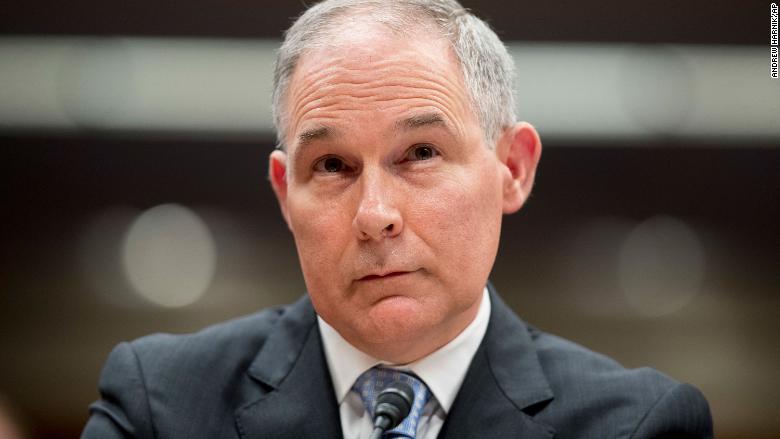
In the end, the whistleblowers made enough noise to be heard.
Concerned Environmental Protection Agency officials and other sources played a key role in exposing EPA Administrator Scott Pruitt's abuses of power. After Pruitt resigned on Thursday afternoon, President Trump said Pruitt "did not want to be a distraction," an acknowledgment of the damning accounts.
Political observers were surprised by how long Pruitt lasted. But eventually, it seems, the system of checks and balances worked. Whistleblowers sought out reporters. The resulting news stories caused outcries. The outcries spurred investigations, or, as Trump might say, "distractions."
Eventually it the said distractions were enough for some of Trump's staunchest advocates, like Fox News' Laura Ingraham, who called for Pruitt to step down. The editorial boards of conservative outlets The Weekly Standard and the National Review also called for Pruitt to go.
Pruitt's defenders in the pro-Trump media are describing a different chain of events. They say journalists and liberal activists wanted a "scalp," and they got one.
Some say he was singled out for his effectiveness in rolling back Obama-era environmental policies. But that argument sidesteps all of the evidence about Pruitt's reported behavior. Over time, journalists from major media outlets became remarkably blunt about calling out Pruitt's abuses of power because the examples were so numerous and so egregious. Several news sites kept running tallies of the scandals.
When the resignation news broke on Thursday, CNN used a scrolling graphic to show all the controversies because the list wouldn't fit on a single screen. As recently as Tuesday, a CNN segment was bluntly titled "HOW DOES EPA CHIEF STILL HAVE JOB?"
The segment was about a former Pruitt deputy -- described as a whistleblower -- who alleged that Pruitt's camp kept "secret" calendars and schedules.
It's difficult, and probably impossible, to pinpoint any single story as being decisive. Trump said Thursday that there was no "final straw."
But there were many, many straws. Whistleblowers, reporters, lawmakers, inspectors general, and advocacy groups all drew attention to Pruitt's taxpayer-funded travel, wasteful spending, use of email, and other scandals.
All over the web on Thursday, people credited whistleblowers and journalists for Pruitt's resignation. Al Gore, an environmentalist and a strong critic of Pruitt's alleged behavior thanked "journalists, advocates, and citizens for exposing Mr. Pruitt as a destructive, unethical, and wasteful head of the #EPA."
Pruitt's defenders from partisan media outlets claimed that he was the casualty of a coordinated effort to take down Trump.
Wall Street Journal columnist Kimberley Strassel tweeted, "Lesson to other Trump officials from Pruitt resignation: Give the left/media/organized greens any molehill and they will turn it into K2. Most of the accusations were overwrought, but the barrage was overwhelming."
The Weekly Standard editor in chief Stephen Hayes responded to her and said, "The other lesson: Be less corrupt."
Later, Strassel admitted Pruitt gave his "opponents" some "ammunition."
Conservative radio host Hugh Hewitt said Pruitt was "caricatured by left and MSM," an abbreviation for mainstream media. Mollie Hemingway, a Fox News contributor, tweeted that the "well funded and media coordinated" anti-Pruitt movement had finally won "its scalp."
Journalists in the newsrooms that probed Pruitt's spending had a very different reaction.
Philip Rucker of The Washington Post called it "accountability journalism at its very best."
And Rebecca Leber of Mother Jones pointed out that the work is not over.
"There's been intense and incredible EPA reporting recently, but with Pruitt out we'll have to keep digging," she tweeted, "and I hope readers stay tuned for it."


